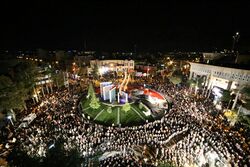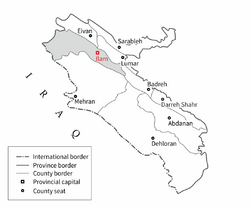Place:Ilam, Iran
Ilam | |
|---|---|
City | |
 A square in Ilam | |
 Location of Ilam in Ilam province | |
| Lua error in Module:Location_map at line 522: Unable to find the specified location map definition: "Module:Location map/data/Ilam Iran" does not exist. | |
| Coordinates: [ ⚑ ] : 33°38′06″N 46°24′26″E / 33.635°N 46.40722°E[1] | |
| Country | Iran |
| Province | Ilam |
| County | Ilam |
| District | Central |
| Government | |
| • Mayor | Afshin Mozaffari |
| Elevation | 1,427 m (4,682 ft) |
| Population (2016)[2] | |
| • Total | 194,030 |
| Time zone | UTC+3:30 (IRST) |
| Area code(s) | 0843 |
| Climate | Csa |
| Website | www |
Ilam (Persian: ايلام; ![]() ایلام)[lower-alpha 1] is a Kurdish city in the Central District of Ilam County, Ilam province, Iran, serving as capital of the province, the county, and the district.[4] The Kabir Kuh mountain range lies east of the city. To the west, it borders Iraq.
ایلام)[lower-alpha 1] is a Kurdish city in the Central District of Ilam County, Ilam province, Iran, serving as capital of the province, the county, and the district.[4] The Kabir Kuh mountain range lies east of the city. To the west, it borders Iraq.
Demographics
Language
Language composition:[5]
Population
| Population history | ||
|---|---|---|
| Year | Pop. | ±% |
| 1956 | 8,346 | — |
| 1966 | 15,493 | +85.6% |
| 1976 | 32,476 | +109.6% |
| 1986 | 89,035 | +174.2% |
| 1991 | 116,428 | +30.8% |
| 1996 | 126,346 | +8.5% |
| 2006 | 155,289[7] | +22.9% |
| 2011 | 172,213[8] | +10.9% |
| 2016 | 194,030[2] | +12.7% |
| Source: [6] | ||
At the time of the 2006 National Census, the city's population was 155,289 in 34,549 households.[7] The following census in 2011 counted 172,213 people in 42,613 households.[8] The 2016 census measured the population of the rural district as 194,030 people in 53,581 households.[2]
Climate
Ilam is situated in the cold mountainous region of Iran at a height of 1,319 metres (4,330 ft) above mean sea level. It is located in the west of Iran at a latitude of 33° 38´ north and longitude of 46° 26´ east. Although this city is surrounded by mountains, its climate is also affected by deserts from the west and the south. This region presents a highly variable annual weather profile. Heavy showers or snow in the winter and dusty, brutally hot, dry weather in the summer are normal for this region.[9] Monthly rainfalls have been as high as 352.1 millimetres (13.86 in) in March 1974, whilst daily rainfalls have reached 86 millimetres or 3.39 inches on 26 February 1991. Temperatures have ranged from a high of 47.0 °C or 116.6 °F on 20 August 1975 to a low of −15.0 °C or 5.0 °F on 5 February 1974.
Ilam's climate is classed under the Köppen climate classification as a Mediterranean climate (Csa) with continental influences. Script error: No such module "weather box".
Script error: No such module "weather box".
Architecture
Like many other regions of Iran, architecture in Ilam includis consists of a mix of both traditional and contemporary periods. Although easy access to fossil fuels and electricity may have aided the transition in Iranian architecture in other regions of Iran from its traditional to modern styles, the increasing population of Ilam may have also played a role in this transition.
The Governor Castle, Falahaty Mansion and The Mirgholam Castle are examples of some surviving traditional buildings in Ilam. The courtyard dwelling is the main type of the buildings of this period. This type of building was accepted as the main building type over all Iran for both climatic and cultural reasons. Brick is the main constructional material in these buildings. The passive thermal techniques indicated for the Iranian traditional buildings are commonly used in these buildings.
The Governor Castle of Ilam was built in type of courtyard. Adding shade and moisture by using green landscape, high trees and a pond, were the main passive techniques used in this building to reduce the temperature in summer. The Mirgholam Castle of Ilam presents a classic Iranian courtyard. The garden and the pound were the main elements of this type of buildings. The Falahaty Mansion used a pitched roof as it was regular beside the flat roofs in the traditional buildings in Ilam earlier.[14]
Colleges and universities
Ilam contains the following universities:
- Ilam University of Medical Sciences[15]
- University of Ilam[16]
- Islamic Azad University of Ilam[16]
- Safir Danesh
- Farhangian University, Shahid Modares Campus of Ilam (Men) and Imam Jafar -e- Sadiqh Campus of Ilam (Women)
Notable people
- Mohsen Amiri, footballer
- Fathollah Amiri, filmmaker
See also
- Eyvan
Notes
References
- ↑ OpenStreetMap contributors (23 November 2024). "Ilam, Ilam County" (Map). OpenStreetMap (in فارسی). Retrieved 23 November 2024.
- ↑ 2.0 2.1 2.2 (in fa) (Excel) Census of the Islamic Republic of Iran, 1395 (2016): Ilam Province (Report). The Statistical Center of Iran. https://www.amar.org.ir/Portals/0/census/1395/results/abadi/CN95_HouseholdPopulationVillage_16.xlsx. Retrieved 19 December 2022.
- ↑ Ilam, Iran can be found at GEOnet Names Server, at this link, by opening the Advanced Search box, entering "-3067203" in the "Unique Feature Id" form, and clicking on "Search Database".
- ↑ Habibi, Hassan (c. 2024) (in fa). Approval of the organization and chain of citizenship of the elements and units of the national divisions of Ilam province, centered in the city of Ilam (Report). Ministry of the Interior, Defense Political Commission of the Government Council. Proposal 3233.1.5.53; Letter 93808-907; Notification 83348/T132K. https://lamtakam.com/law/council_of_ministers/113044. Retrieved 8 February 2024.
- ↑ "Language distribution: Ilam Province". http://iranatlas.net/index.html?module=module.language-distribution.ilam#eyJ0IjoieCIsImkiOiI5MTIyOTFmNDM3Yjg4NzkxNThkOTQ2ZTNhNjQwOTkyZCIsInMiOjE2Mjk3Mjc3MDcwNTZ9.
- ↑ "Cities with a population of 100,000 and more (1956-2006 census)" (XLS). Iran data portal. p. 1. https://irandataportal.syr.edu/wp-content/uploads/13-cities-with-a-population-of-100-000-and-more-1335-1385-1956-2006-census-1.xlsx.
- ↑ 7.0 7.1 (in fa) (Excel) Census of the Islamic Republic of Iran, 1385 (2006): Ilam Province (Report). The Statistical Center of Iran. http://www.amar.org.ir/DesktopModules/FTPManager/upload/upload2360/newjkh/newjkh/16.xls. Retrieved 25 September 2022.
- ↑ 8.0 8.1 (in fa) (Excel) Census of the Islamic Republic of Iran, 1390 (2011): Ilam Province (Report). The Statistical Center of Iran. https://irandataportal.syr.edu/wp-content/uploads/Ilam.xls. Retrieved 19 December 2022.
- ↑ J Khodakarami and I Knight. Required and Current Thermal Conditions for Occupants in Iranian Hospitals. HVAC&R Research, Vol. 14, Number 2, March 2008, pp 175-194
- ↑ "World Meteorological Organization Climate Normals for 1991-2020: Ilam". NOAA. https://www.nodc.noaa.gov/archive/arc0216/0253808/2.2/data/0-data/Region-2-WMO-Normals-9120/Iran/CSV/Ilam_40780.csv.
- ↑ "FORM 1: STATION ILAM". Iranian Meteorological Organization. http://www.irimo.ir/english/statistics/climanormals/ilam/ILAM.txt.
- ↑ "FORM 32: NO. OF DAYS WITH SNOW OR SLEET Station: Ilam(40780)". Iranian Meteorological Organization. http://www.irimo.ir/english/statistics/climanormals/ilam/ILAM.txt.
- ↑ "FORM 1: STATION ILAM". Iranian Meteorological Organization. http://www.irimo.ir/english/statistics/climanormals/ilam/ILAM.txt.
- ↑ J Khodakarami. Achieving Thermal Comfort in Iranian Hospitals. Cardiff University, PhD Thesis, 2008
- ↑ "Ilam University of Medical Sciences". Ilam University of Medical Sciences. https://www.medilam.ac.ir/.
- ↑ 16.0 16.1 "Ilam University". Ilam University. https://www.ilam.ac.ir/.
External links
- Farshid Sāmāni, Ilam, the Sleeping Beauty, in Persian, Jadid Online, 26 May 2009: [1].
• Discovering Ilam, in English, Jadid Online, 22 October 2009, [2].
• Photo gallery, containing 25 photographs with informative captions in English: [3].
 |
